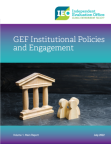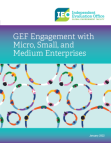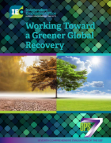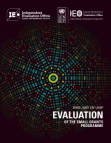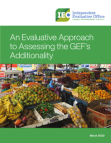Knowledge is an important resource of the Global Environment Facility (GEF) that supports its strategic objectives to address global environmental concerns. Over the years, the GEF facilitated generation and sharing of knowledge through its projects and programs, as well as through its corporate…
Knowledge Management (KM) in the GEF 2020
GEF Institutional Policies and Engagement
Since inception, the Global Environment Facility (GEF) has been explicit about the importance of involving stakeholders, initially described as "the public", in GEF-financed interventions. This is stated in the original GEF Instrument and reflected in a series of policies, guidance, and…
GEF Engagement with Micro, Small, and Medium Enterprises (MSMEs)
The Global Environment Facility (GEF) has a long history of supporting micro, small, and medium enterprises (MSMEs). As the GEF has shifted into more integrated approaches, it has also increasingly engaged MSMEs not only as a source of innovation and as beneficiaries, but also as a partner in…
Working Toward a Greener Global Recovery (OPS7)
The 8th replenishment of the Global Environment Facility (GEF) will take place in an international context that is very difficult to predict and navigate. The global environment continues on a downward trend, and more than a decade after the financial crisis of 2008, the world economy…
GEF Support to Innovation: Findings and Lessons
Since the creation of the Global Environment Facility (GEF) as a pilot program in 1991, there has been an expectation that the GEF would be an innovative institution and will use innovation to maximize its impact on global environmental benefits. More recently, the GEF2020 Strategy and GEF-7…
Third Joint GEF-UNDP Evaluation of the Small Grants Programme (SGP) 2021
The GEF created the Small Grants Programme (SGP) in 1992 with the explicit aim of developing community-led and -owned strategies and technologies for reducing threats to the global environment—notably in connection with biodiversity loss, mitigating climate change, land degradation and…
Review of the GEF Terminal Evaluation Validation Process
Non-Grant Instrument (NGI)
Within the context of GEF programming, a non-grant instrument may be understood as a mechanism to provide financing for activities that have a potential to generate financial reflows for the financer, irrespective of whether such reflows materialize. Cumulatively, GEF has provided a financing of…
An Evaluative Approach to Assessing GEF's Additionality
Since its inception in 1992, the GEF has been at the forefront of leveraging local investments to achieve global impact. Yet. accounting for the GEF's additionality - additional benefits that are attributable to the GEF - has remained a challenge.
Despite modifications and clarifications…
GEF Evaluation Policy 2019
The GEF addresses global environmental issues while supporting national sustainable development initiatives. It does so through a partnership involving 184 member countries, 18 Agencies, recipient countries, civil society organizations, and the private sector. In such a large partnership, a…

